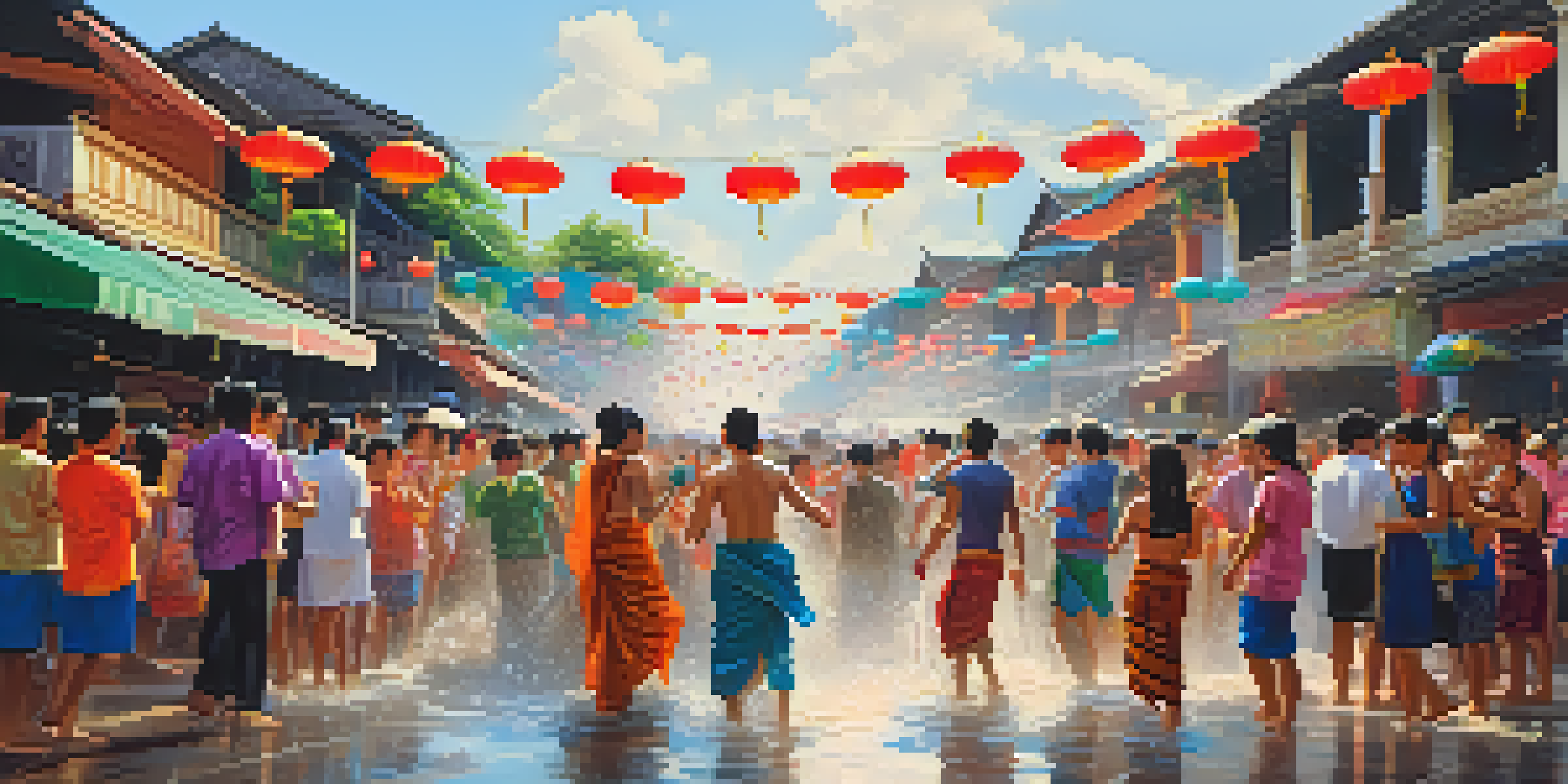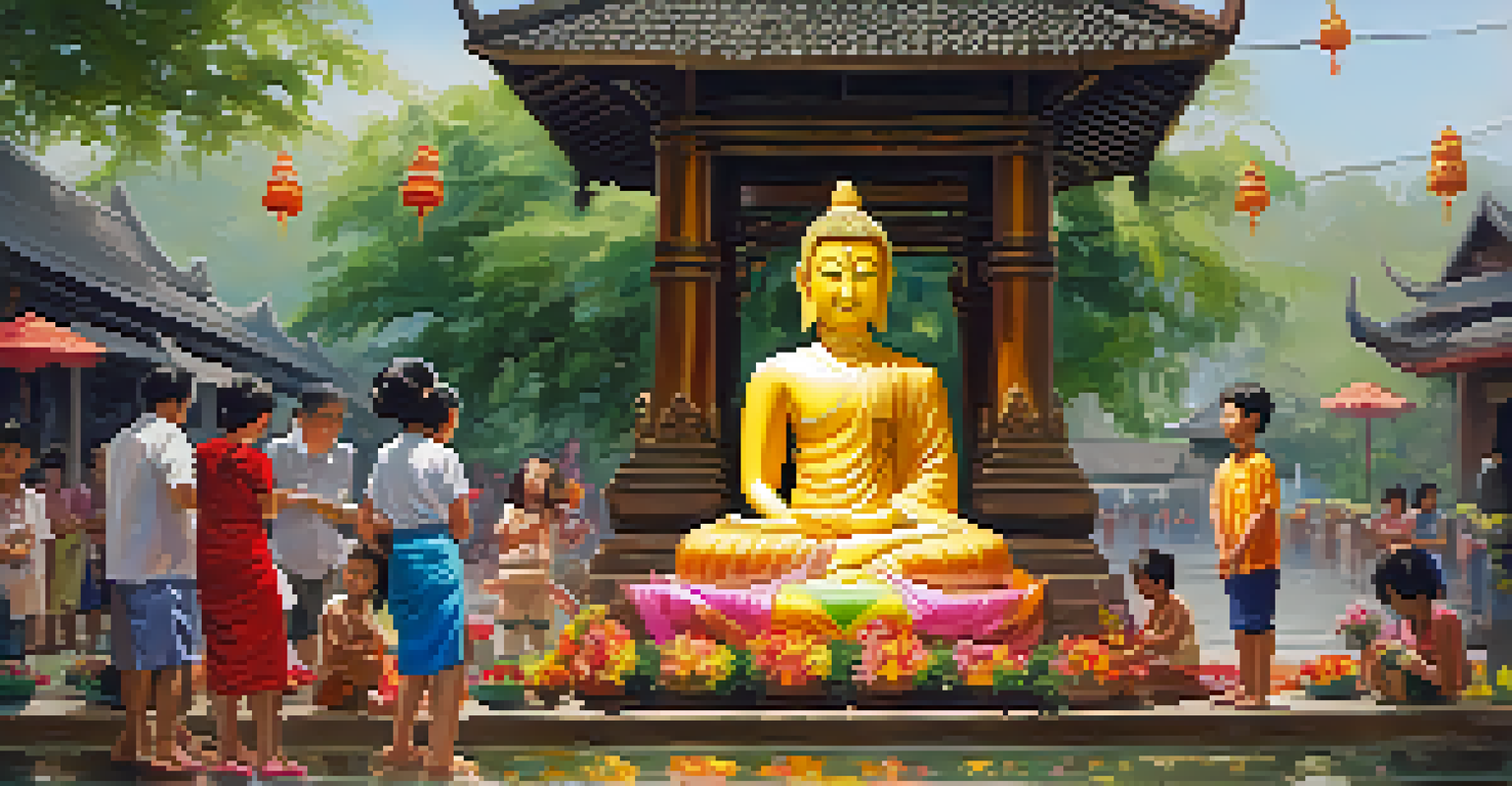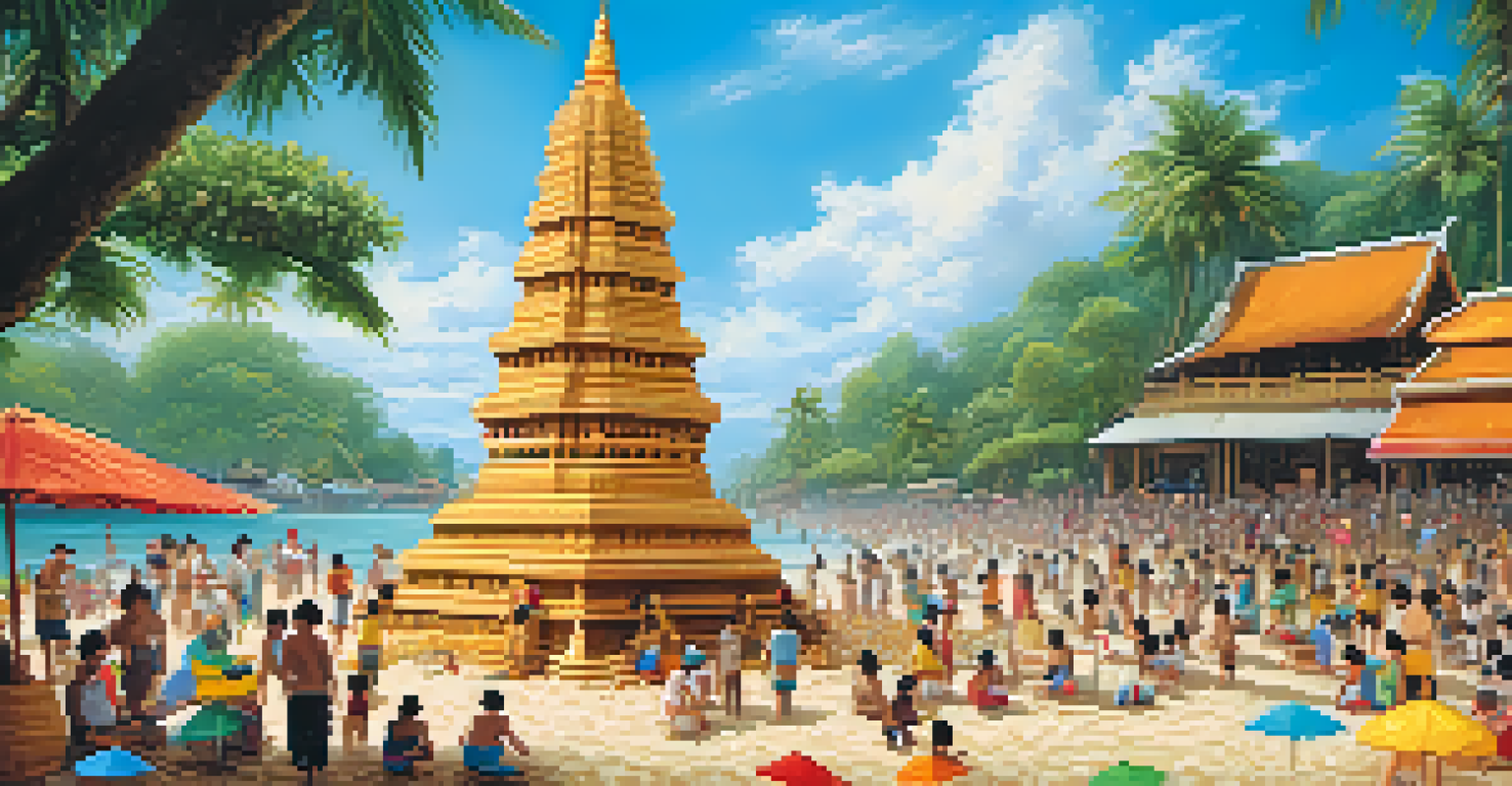Understanding the Cultural Importance of Thai New Year Festival

Introduction to Thai New Year: Songkran Festival
Thai New Year, known as Songkran, is a vibrant festival celebrated every April. It marks the arrival of the solar calendar and is a time for renewal and cleansing. The festival is famous for its water fights, symbolizing the washing away of sins and bad luck from the previous year.
Water is the source of life, and purity is the key to happiness.
Songkran is not just about the fun of water splashes; it is deeply rooted in Thai culture and spirituality. Families come together to honor their ancestors, visit temples, and perform traditional rituals. This blend of celebration and reverence makes Songkran a unique cultural experience.
As we dive deeper into the festival's significance, we will explore its historical origins, the customs that define it, and how it has evolved over the years. Understanding Songkran offers a glimpse into the heart of Thai cultural identity.
Historical Origins of Songkran Festival
The origins of Songkran can be traced back to ancient Indian traditions associated with the solar calendar. The word 'Songkran' itself comes from the Sanskrit term meaning 'astrological passage.' Initially, it was a time for family gatherings and religious observances.

Over the centuries, Songkran has evolved, incorporating local customs and beliefs. The festival was influenced by Buddhist practices, where water is seen as a purifying element. This connection to spirituality is what gives the festival its profound significance beyond mere celebration.
Songkran: A Cultural Celebration
Songkran is a vibrant festival that blends traditional customs with modern festivities, celebrating the Thai New Year through water-related rituals.
Today, while the playful water battles have become a hallmark of Songkran, the festival still retains its roots in tradition and spirituality. Understanding these historical layers adds depth to our appreciation of the festival.
Significance of Water in Songkran Celebrations
Water plays a central role in the Songkran celebration, symbolizing purification and renewal. Traditionally, people gently pour water over Buddha statues and their elders as a sign of respect and to seek blessings for the coming year. This act of pouring water is more than just a ritual; it's a heartfelt gesture of love and gratitude.
Tradition is not the worship of ashes, but the preservation of fire.
Moreover, the playful water fights that occur in the streets have become a modern interpretation of this tradition. While it may seem like just a fun activity, it still embodies the spirit of cleansing and joy, allowing participants to let go of negativity.
Understanding the significance of water in Songkran helps us appreciate the festival on a deeper level. It reminds us of the importance of renewal and the joy of community engagement.
Traditional Customs During Songkran
Songkran is replete with various traditional customs that reflect Thailand's rich cultural heritage. One of the most notable customs is the sand pagoda building, where people create small pagodas from sand, which they then decorate with flowers. This tradition symbolizes the return of the earth's bounty and the renewal of life.
Additionally, many families engage in the ritual of 'Rod Nam Dum Hua,' where younger generations pour water over the hands of their elders, seeking their blessings. This act embodies respect for family and reinforces the bonds between generations.
Significance of Water Rituals
Water symbolizes purification and renewal during Songkran, as people pour water over Buddha statues and elders to seek blessings and express gratitude.
These customs not only enrich the festival's atmosphere but also serve to educate younger generations about their cultural heritage. By participating in these rituals, the significance of Songkran is passed down through the ages.
Modern Celebrations and Global Influence
In recent years, Songkran has gained international recognition, attracting tourists from around the world who wish to partake in the festivities. Cities like Bangkok and Chiang Mai transform into lively hubs of celebration, where locals and visitors join in massive water fights and street parties. This global interest has led to a fusion of traditional and modern elements in the way Songkran is celebrated.
While the essence of the festival remains intact, the incorporation of music, dance, and international influences has created a unique atmosphere. Tourists often find themselves enchanted by the lively spirit of Songkran, prompting them to return year after year.
This blending of cultures not only highlights the adaptability of Thai traditions but also showcases the festival as a celebration of unity and joy. Songkran's evolution reflects the changing times while still honoring its roots.
Environmental Considerations of Songkran
As with any large-scale celebration, Songkran raises questions about environmental impact. The extensive use of water, particularly in urban areas, has sparked discussions about sustainability. Many communities are now advocating for responsible water use and the reduction of plastic waste during celebrations.
Initiatives such as promoting eco-friendly alternatives for water fights and encouraging waste reduction during the festival are gaining traction. These efforts aim to preserve the natural beauty of Thailand while still allowing people to enjoy the festivities.
Environmental Impact Awareness
As Songkran gains popularity, there is a growing emphasis on sustainability, encouraging responsible water use and waste reduction during the celebrations.
By raising awareness about environmental considerations, the Songkran festival can evolve into a more sustainable celebration. This shift not only honors the spirit of renewal but also aligns with a growing global emphasis on environmental responsibility.
Conclusion: Embracing the Spirit of Songkran
As we conclude our exploration of the Thai New Year, it’s evident that Songkran is much more than a festival of water. It is a celebration of life, family, and cultural heritage that resonates deeply with the Thai people. The blend of traditional customs with modern celebrations creates an atmosphere that is both joyous and meaningful.
Participating in Songkran, whether in Thailand or as an observer from afar, offers a unique opportunity to connect with a rich cultural tapestry. It encourages reflection on our own traditions and the values we hold dear.

Ultimately, Songkran invites us all to embrace the spirit of renewal, joy, and community. As the water flows, so too does the connection between past and present, reminding us of the importance of celebrating life together.